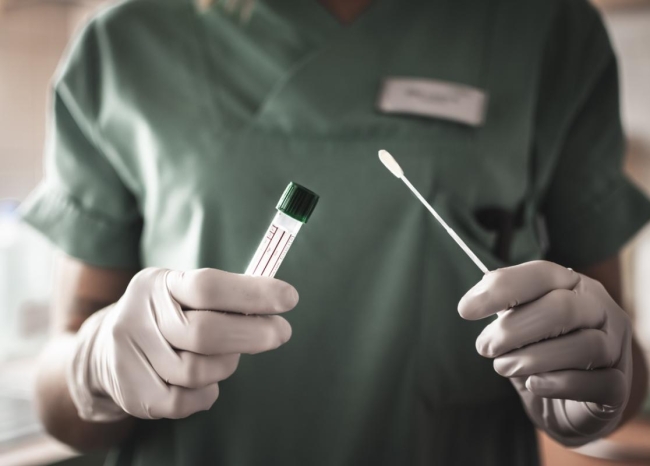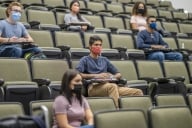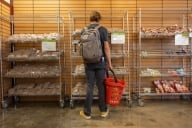You have /5 articles left.
Sign up for a free account or log in.

istock.com/Meyer & Meyer
When Dr. Anthony Fauci was asked at a Senate hearing in May what it would take for students to feel comfortable going back to campuses during the coronavirus pandemic, he said ultimately what would need to happen is for there to be a vaccine.
He later walked back the remark in part to say colleges could reopen even before there is a vaccine. But for many college presidents, like Alabama State University’s Quinton T. Ross, the hope for a vaccine has been a much-anticipated milestone in the distance that could lead to a return to normalcy, when students would no longer have to wear masks and he wouldn’t have to worry that social distancing isn't being practiced at campus keggers.
But putting into question how much impact the vaccine will have on campuses if many students are still succepitible to the disease are two recent polls that say about a third of college-aged Americans are at least leaning against getting the vaccine when one is available. That will force colleges to make choices like whether to require students and workers to get vaccinated.
The reasons why so many younger adults say they might not be vaccinated are apparent in the rumors of COVID-19 parties in Tuscaloosa, Ala., and the scenes of crowded bars and beaches -- many believe the virus isn’t a threat. There is unease as well about the rush to create the vaccine, health experts say.
A Pew Research Center survey in late April and early May found 31 percent of adults who are millennials or younger say they probably or definitely will not get vaccinated, far higher than the 20 percent of baby boomers and 27 percent of Americans of all ages who are leaning against getting the vaccine.
A second poll in May, by the Associated Press and the University of Chicago’s NORC Center for Public Affairs Research, found similar results. Thirty-five percent of 18- to 29-year-olds, an age group that includes most college students, said they will not get vaccinated. Another 22 percent said they weren’t sure.
The percentage of younger adults saying they will not get vaccinated was the largest of any age group in the poll, double the 18 percent of 30- to 44-year-olds and the 20 percent of 45- to 59-year-olds who said they will not get vaccinated.
Due to differences in the responses those surveyed were asked to give, the percentage of those saying they would get vaccinated differed in the two polls.
Only 42 percent of 18- to 29-year-olds in the AP-NORC poll said they would definitely take the vaccine.
The Pew poll, which also asked which way respondents were leaning, found 68 percent of adults who are millennials or younger would either definitely or probably get vaccinated.
Among all age groups, the AP-NORC poll said half would definitely get vaccinated, while 72 percent of Pew’s respondents said they would, or probably would, get vaccinated.
Still, that about a third in either survey said they are not planning to take a vaccine that’s being viewed as key to a return to normalcy is disconcerting to those like Ross of Alabama State and Devin A. Jopp, chief executive officer of the American College Health Association.
“It would help at all levels. It would help with regaining some sense of normalcy,” Ross said of widespread vaccination on his campus for the disease.
Sue Ellspermann, president of Ivy Tech Community College, Indiana's two-year system, said she’d want students to get vaccinated, but she stopped short of saying she’d require it. “We would certainly encourage our students and employees to get a vaccination when a vaccine is available for the good of the entire community,” she said.
One sign of optimism for colleges in the Pew study, however, is that the percentage of those who said they are, at least, probably going to be vaccinated increased with education. While 30 percent of those with a high school education or less, and 31 percent of those with some college education, said they were likely not going to be vaccinated, only 22 percent of college graduates and 16 percent of those with a postgraduate degree said the same.
The prospect of a vaccine finally being developed, only to be ignored by many Americans, alarmed Senator Tim Scott, a Republican from South Carolina, at a recent education committee hearing on reopening campuses.
Fauci, director of the National Institute of Allergy and Infectious Diseases, agreed at the hearing: “I share with you the concern that we’ll get to the hoop, and we get a safe and effective vaccine, only to find a substantial portion of the population do not want to get vaccinated,” he said.
Choices for Colleges Are Coming
The polls raise a number of policy questions for colleges, not the least of which is whether to require students and staff to get tested at a time of strong opposition by those distrustful of vaccines.
College administrators and health officials nationally will also face deep distrust in vaccinations, particularly among Black adults.
“Even more alarming” in the AP-NORC poll, Scott said, was that only 25 percent of Black respondents and 37 percent of Hispanics said they would get vaccinated. In comparison, 56 percent of whites said they would get the vaccine.
The Pew poll found a similar racial divide. Three-fourths of all whites said they would definitely or probably get vaccinated, compared to only 54 percent of Black respondents. Nearly half of Black Americans, 44 percent, said they definitely or probably would not get the vaccine.
With a vaccine still months from becoming a reality, and colleges preoccupied with trying to reopen campuses in the fall, institutions haven’t yet focused on how to encourage, or require, vaccinations, said Jopp and Terry Hartle, the American Council on Education’s senior vice president for government and public affairs. But Jopp said the issue is looming.
“It’s an important question. Vaccine policy is an up-and-coming issue everybody is going to have to deal with soon,” said Jopp, whose organization is conducting surveys to get a sense of the vaccination policies at institutions.
The uncertainty over how many students will choose to be vaccinated only adds to questions about how quickly a vaccine will allow campuses to lift the precautions they are taking, like requiring the wearing of masks, Jopp said.
No vaccine ensures everybody who takes it is protected, he said. It will take time to assess how effective it is. It’s also unclear who will pay for them, he said, and if colleges will be able to afford and get their hands on the vaccines right away.
Until those questions are answered, he said, requirements for social distancing and other measures will not be immediately lifted when a vaccine becomes available. “It’s probably not going to be the light-switch approach,” he said.
Require Vaccinations?
Institutions of higher education generally require some vaccinations already, such as for illnesses like measles, mumps and rubella. Some, like the University of California system, require other vaccinations for conditions like chickenpox.
But unlike K-12 schools, many states leave it to colleges and universities to set their own vaccination requirements. Spokespeople for health departments in Pennsylvania and California said it will be up to colleges to decide whether to require a coronavirus vaccination.
Some states, however, do set requirements for colleges. Oregon, for instance, requires students at two- and four-year institutions to be vaccinated for measles.
The Oregon state health department would have the authority to require students at four-year colleges be vaccinated for coronavirus but doesn’t now have plans to do so, a spokesman for the department said. The department also only has authority to require immunizations against measles for those who work in clinical settings, childcare or compete in sports. The state’s Legislature would have to give the agency the authority.
Georges Benjamin, executive director of the American Public Health Association, said it’s too early to say whether a coronavirus vaccination should be required. It’s still unknown what kinds of side effects it will have, he said.
Several universities, including the University of California system and the University of Washington, also said it’s too early to say whether they will require vaccinations.
Any move to require vaccinations, however, would be opposed by the antivaccine movement. Groups, like Children’s Health Defense, founded by Robert F. Kennedy Jr., are raising concerns about the fast development of a vaccine, saying that in the rush, potential health risks are being ignored.
“It goes to individual rights,” said Laura Bono, Children’s Health Defense’s executive director. “Does the state or the federal government or an employer have the right to make you take the very real risk of getting a vaccine?”
It’s no surprise younger adults are less likely to say they will get vaccinated, she said, given they are less likely than older people to suffer serious consequences.
Another group, Texans for Vaccine Choice, is demanding in an online petition that Greg Abbott, Texas’s Republican governor, promise a coronavirus vaccine will not be required to return to work or school or get social services.
Distrust Among Black Respondents
Encouraging people to get vaccinated, however, faces challenges, particularly among Black Americans, who hold a historic distrust of the medical establishment going back to incidents like the infamous Tuskegee study, Benjamin said.
Beginning in 1932 and lasting for 40 years, 600 Black men in a federal study on syphilis were given annual physicals and told they were receiving treatment, when they were not. They were not told when penicillin began being used to treat the disease in 1947, and the men continued to go untreated for the next quarter century.
Indeed, the Pew survey found that only 35 percent of Black Americans, compared to 43 percent of whites, believe medical scientists serve the public good.
While two-thirds of whites say the benefits of experimental treatments outweigh the risks, Black respondents had the opposite view. Nearly 60 percent in the poll said the risks outweigh the benefits.
Ross said he understands the skepticism in the Black community. But if tests show a vaccine is safe, the situation would be different from the Tuskegee study, he said. Rather than singling out a single race for lesser treatment, the vaccine would be available to all.
Fauci at the hearing said his department is working on a strategy to encourage people to be vaccinated. Key, he said, is “there needs to be an engagement of people communities trust, especially noted sports figures or whatever,” he said. He likened what will be necessary to the public health strategy during the AIDS epidemic.
“We used people in the community, boots on the ground, who looked and lived like the people they tried to engage,” he said.
Education about the disease can make an impact, said Emily Brunson, a medical anthropologist at Texas State University. “Especially if it is framed as allowing you to resume normal college activities like football games or being in school in person at all,” said Brunson, who also works with the Johns Hopkins Center for Health Security.
Benjamin, in an interview, said hesitancy about the vaccine will fade over time.
“Once we know more about the vaccine, we’ll be able to more intelligently articulate the pros and cons of getting a shot,” he said.
And, unfortunately, he said, more younger adults will come to realize they are not safe. “Tragically we will see that more young people will get the disease,” he said. “More young people will have the experience, unfortunately, of seeing someone they know getting sick.”








